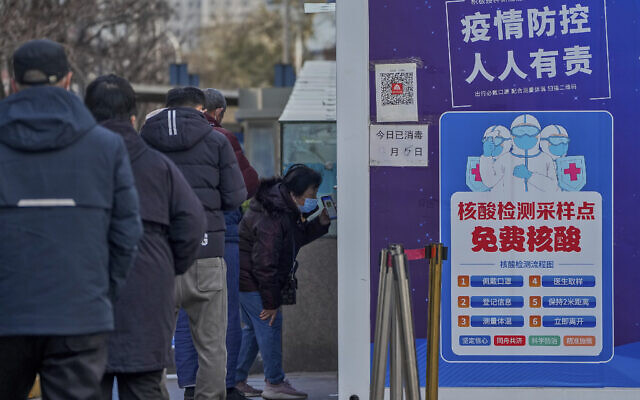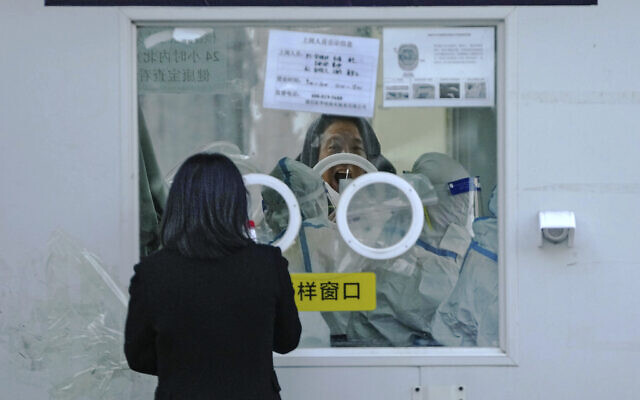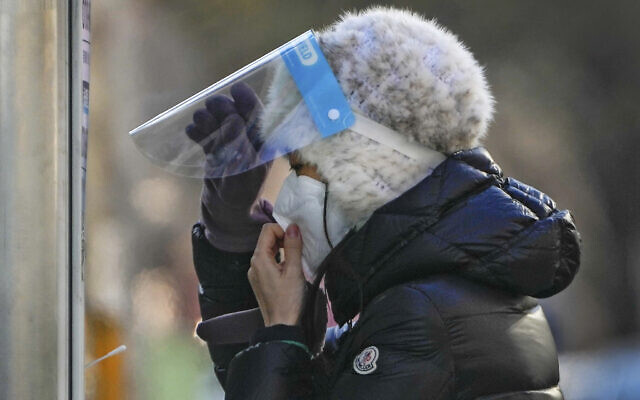BEIJING, China — China announced Wednesday a nationwide loosening of COVID-19 restrictions following protests against the hardline strategy that grew into calls for greater political freedoms.
Anger over China’s zero-COVID policy — which involved mass lockdowns, constant testing, and quarantines even for people who were not infected — stoked unrest not seen since the 1989 pro-democracy protests.
Under the new guidelines announced by the National Health Commission, the frequency and scope of PCR testing — long a tedious mainstay of life in zero-COVID China — will be reduced.
Lockdowns will also be scaled down and people with non-severe COVID cases can isolate at home instead of centralized government facilities.
And people will no longer be required to show a green health code on their phone to enter public buildings and spaces, except for “nursing homes, medical institutions, kindergartens, middle and high schools.”
Get The Times of Israel's Daily Edition by email and never miss our top stories
The new rules scrap the forced quarantines for people with no symptoms or with mild cases.

A woman shows her health check QR code as residents line up to get their routine COVID-19 throat swabs at a coronavirus testing site, December 7, 2022. (Andy Wong/AP)
“Asymptomatic infected persons and mild cases who are eligible for home isolation are generally isolated at home, or they can voluntarily choose centralized isolation for treatment,” the new rules read.
“Mass PCR testing only carried out in schools, hospitals, nursing homes and high-risk work units; scope and frequency of PCR testing to be further reduced,” they added.
“People traveling across provinces do not need to provide a 48h test result and do not need to test upon arrival.”
China will also accelerate the vaccination of the elderly, the NHC said, long seen as a major obstacle to the relaxation of Beijing’s no-tolerance approach to COVID.
Rare demonstrations against the ruling Communist Party’s zero-COVID strategy broke out across China late last month.
They expanded into calls for more political freedoms, with some even calling for President Xi Jinping to resign.
Authorities cracked down on subsequent efforts to protest while easing a number of restrictions, with some Chinese cities tentatively rolling back mass testing and curbs on movement.

A man has his routine COVID-19 throat swab at a coronavirus testing site in Beijing, December 6, 2022. (Andy Wong/AP)
The capital Beijing, where many businesses have fully reopened, said this week that commuters were no longer required to show a negative virus test taken within 48 hours to use public transport.
Financial hub Shanghai — which underwent a brutal two-month lockdown this year — announced the same rules, with residents able to enter outdoor venues such as parks and tourist attractions without a recent test.
And once dominated by doom and gloom coverage of the dangers of the virus and scenes of pandemic chaos abroad, China’s tightly controlled media dramatically shifted its tone to support a tentative move away from zero-COVID.
The prevalent Omicron strain is “not at all like last year’s Delta variant,” Guangzhou-based medicine professor Chong Yutian said in an article published by the Communist Party-run China Youth Daily.
“After infection with the Omicron variant, the vast majority will have no or light symptoms, and very few will go on to have severe symptoms, this is already widely known,” he assured readers.
But analysts at Japanese firm Nomura on Monday calculated that 53 cities — home to nearly a third of China’s population — still had some restrictions in place.

A woman wearing a face mask and face shield get ready for her routine COVID-19 throat swab at a coronavirus testing site in Beijing, December 7, 2022. (Andy Wong/AP)
Wednesday’s announcement came hours after the government released further data showing the crippling economic impacts of zero-COVID.
Imports and exports plunged in November to levels not seen since early 2020.
Imports in November fell 10.6 percent year-on-year, the biggest drop since May 2020, according to the General Administration of Customs. Exports fell 8.7% over the same period.


